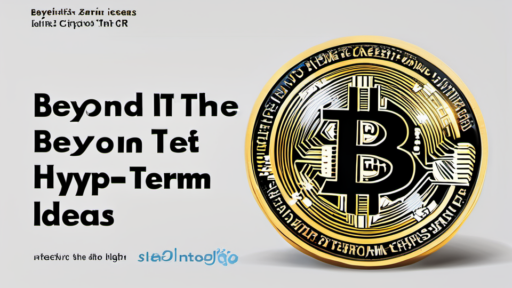Think crypto is just a fad? Think again! The cryptocurrency revolution is just getting started, and a tidal wave of innovation is about to crash onto the global financial landscape.
From decentralized finance (DeFi) and non-fungible tokens (NFTs) to metaverse integration and central bank digital currencies (CBDCs), the world of crypto is about to change forever. Let’s dive into ten groundbreaking ideas that will shape the future of crypto!
1. DeFi: Reimagining Finance
DeFi, or decentralized finance, is a hotbed of innovation that’s completely changing how we think about traditional financial services. It’s essentially about building financial applications on blockchain networks, giving people more control over their assets and data.
Decentralized Trading & Lending:
Instead of relying on centralized exchanges, DeFi enables users to directly trade and lend cryptocurrencies via smart contracts. Decentralized exchanges (DEXs) offer transparency and censorship resistance, while lending protocols allow users to earn interest on their crypto holdings.
Algorithmic Stablecoins:
These innovative coins are designed to maintain a stable price, often pegged to a fiat currency like the US dollar. They operate through algorithmic mechanisms that adjust supply and demand to keep their value stable. Algorithmic stablecoins have the potential to revolutionize cross-border payments and remittances, offering fast, low-cost transactions.
2. NFTs: Beyond Digital Art
NFTs, or non-fungible tokens, have captured the world’s attention with their ability to represent ownership of unique digital assets. But they’re so much more than just a hype train for digital art.
The Power of Scarcity:
The unique nature of NFTs allows them to represent ownership of rare digital collectibles and in-game assets. This opens up possibilities for digital scarcity and verified authenticity, revolutionizing the world of collectibles.
Unlocking New Business Models:
Beyond the hype surrounding art and collectibles, NFTs are revolutionizing the entertainment and gaming industries. Artists can sell digital artwork directly to collectors without needing middlemen. Game developers can leverage NFTs to create economies and incentivize participation within their games.
3. The Metaverse & Cryptocurrency Integration
The metaverse is an exciting frontier where digital and physical realities converge. It’s no surprise that cryptocurrencies are poised to play a crucial role in powering this new digital world.
Cryptocurrency Payments in Virtual Worlds:
Imagine a world where you can buy digital land, clothes, and experiences in the metaverse using cryptocurrencies. This integration will make these virtual economies flourish and empower users with greater control over their digital assets.
DeFi Applications in the Metaverse:
Beyond basic transactions, DeFi applications will be essential for establishing financial systems within virtual worlds. Decentralized lending protocols will help users obtain virtual assets, while decentralized marketplaces will foster a dynamic economy within the metaverse.
4. Central Bank Digital Currencies (CBDCs): A Global Trend
While some countries have been hesitant to embrace cryptocurrencies, the rise of central bank digital currencies (CBDCs) marks a significant shift. These digital versions of national currencies offer potential benefits for faster transactions and enhanced financial inclusion.
Benefits of CBDCs:
- Faster and More Efficient Payments: CBDCs promise to drastically reduce transaction times, offering a faster alternative to traditional financial systems.
- Improved Financial Inclusion: Digital currencies can facilitate access to financial services for unbanked populations, extending financial opportunities to a wider audience.
- Reduced Transaction Costs: The lower processing costs associated with digital transactions can potentially lower costs for businesses and individuals.
Potential Challenges:
Despite their promise, CBDCs present unique challenges:
- Data Privacy and Security: Governments must balance the benefits of a digital currency with concerns over data privacy and the potential for surveillance.
- Monetary Policy Considerations: Central banks need to consider the implications of a digital currency on monetary policy, ensuring stability and mitigating risks associated with fluctuations in the digital currency’s value.
5. Cross-Border Payments: A Frictionless Future
Cryptocurrencies are poised to transform the way we send money across borders, removing barriers and making international transfers faster and cheaper.
Lightning-Fast Transactions:
Unlike traditional cross-border payments, which often involve multiple intermediaries and delays, cryptocurrencies can facilitate almost instantaneous transactions.
Low Transaction Fees:
By cutting out middlemen, cryptocurrencies offer lower transaction fees compared to traditional methods, making cross-border payments more affordable for individuals and businesses alike.
6. Crypto for Everyday Use:
The future of crypto isn’t just about speculation and investments but about everyday use. New innovations are making it easier than ever to use cryptocurrencies for daily purchases and transactions.
Growing Adoption by Businesses:
- Point-of-sale (POS) solutions are becoming increasingly popular, enabling merchants to accept crypto payments at their businesses.
- Crypto debit cards allow users to spend their crypto holdings in real-world scenarios, providing a convenient and secure way to utilize their digital assets.
Consumer-Focused Products and Services:
From crypto-powered mobile wallets to online payment processors, the cryptocurrency ecosystem is constantly evolving to provide consumer-friendly options for integrating crypto into daily life.
7. Blockchain for Social Impact:
Blockchain technology, the underlying framework behind cryptocurrencies, has tremendous potential to create social impact by fostering transparency, accountability, and fairness across different industries.
Improving Supply Chain Transparency:
Blockchain technology can provide an immutable record of goods throughout their journey from production to consumption, reducing fraud and ensuring product authenticity. This transparency benefits both consumers and businesses by fostering trust and increasing accountability.
Empowering Healthcare & Charity:
Blockchain can enhance data security and transparency in the healthcare sector, enabling secure storage and sharing of medical records. It can also be used to track donations to charities, ensuring transparency and accountability.
8. Institutional Adoption of Cryptocurrency:
Big financial institutions are slowly warming up to cryptocurrencies, opening up opportunities for more institutional participation and the broader adoption of digital assets.
Investing in Crypto Funds:
Traditional investment firms are launching crypto funds, providing institutional investors with avenues to allocate capital to the growing cryptocurrency market.
Trading and Custody Solutions:
Several companies are offering sophisticated trading platforms and custodial services designed specifically for institutions, catering to the specific needs of large financial players.
9. Smart Contracts: Automation and Efficiency
Smart contracts are computer programs that automate and enforce agreements between parties on a blockchain. They’re poised to streamline and enhance a wide range of transactions, improving efficiency and reducing errors.






